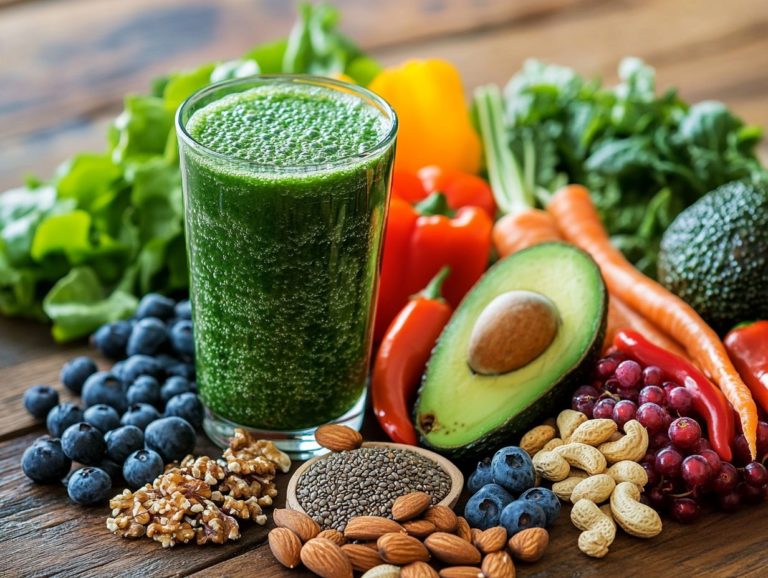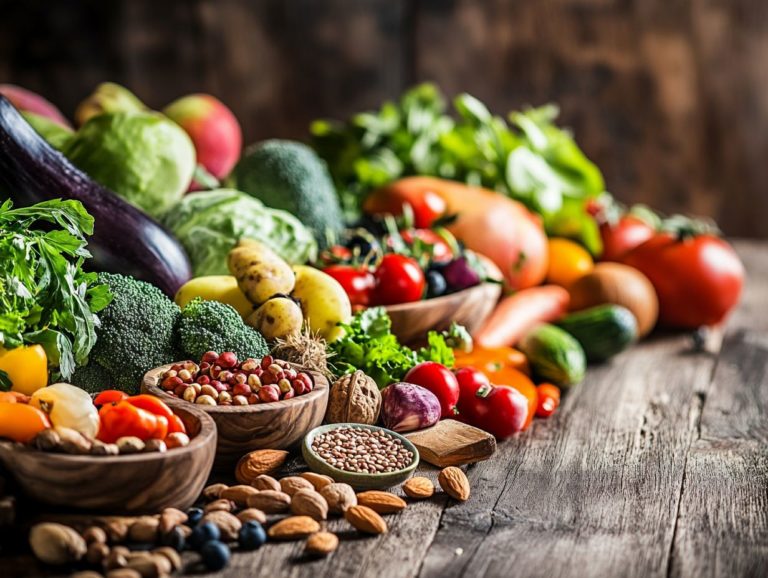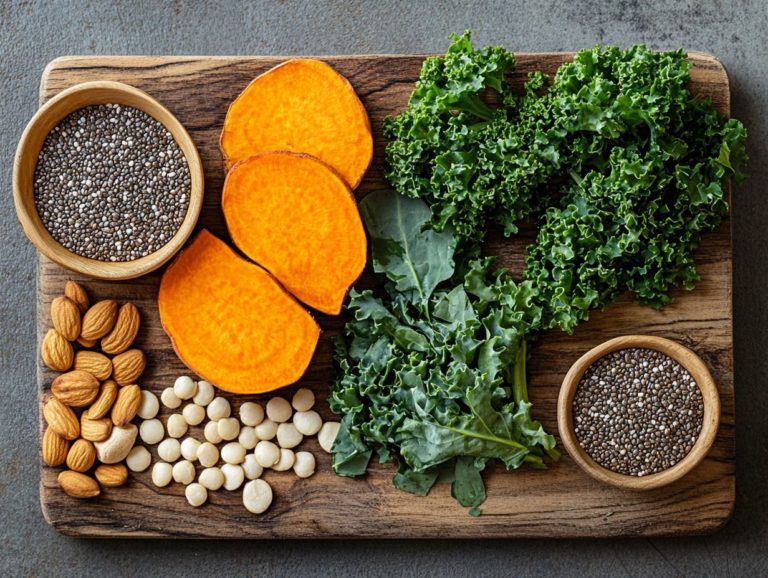5 Must-Try Fermented Foods
Fermented foods have experienced a remarkable rise in popularity, and it’s easy to see why. These delightful additions do more than just excite your palate; they come packed with an array of health benefits.
From the tangy effervescence of kombucha to the vibrant kick of kimchi, each of the top five fermented foods presents unique flavors and nutritional advantages.
Discover how these foods can supercharge your digestion, improve your gut health, and even elevate your mood. We ll clear up common misconceptions and offer practical tips on seamlessly integrating these delectable options into your daily meals.
Get ready to transform your dining experience! Let s plunge into this flavorful journey!
Contents
- Key Takeaways:
- 1. Kombucha
- 2. Sauerkraut
- 3. Kimchi
- 4. Tempeh
- 5. Kefir
- What Are Fermented Foods and Why Are They Beneficial?
- Frequently Asked Questions
- What are the health benefits of consuming fermented foods?
- What are the top 5 must-try fermented foods?
- Are there any potential risks associated with consuming fermented foods?
- Can fermented foods go bad?
- What are some easy ways to incorporate fermented foods into my diet?
- Can I make my own fermented foods at home?
Key Takeaways:
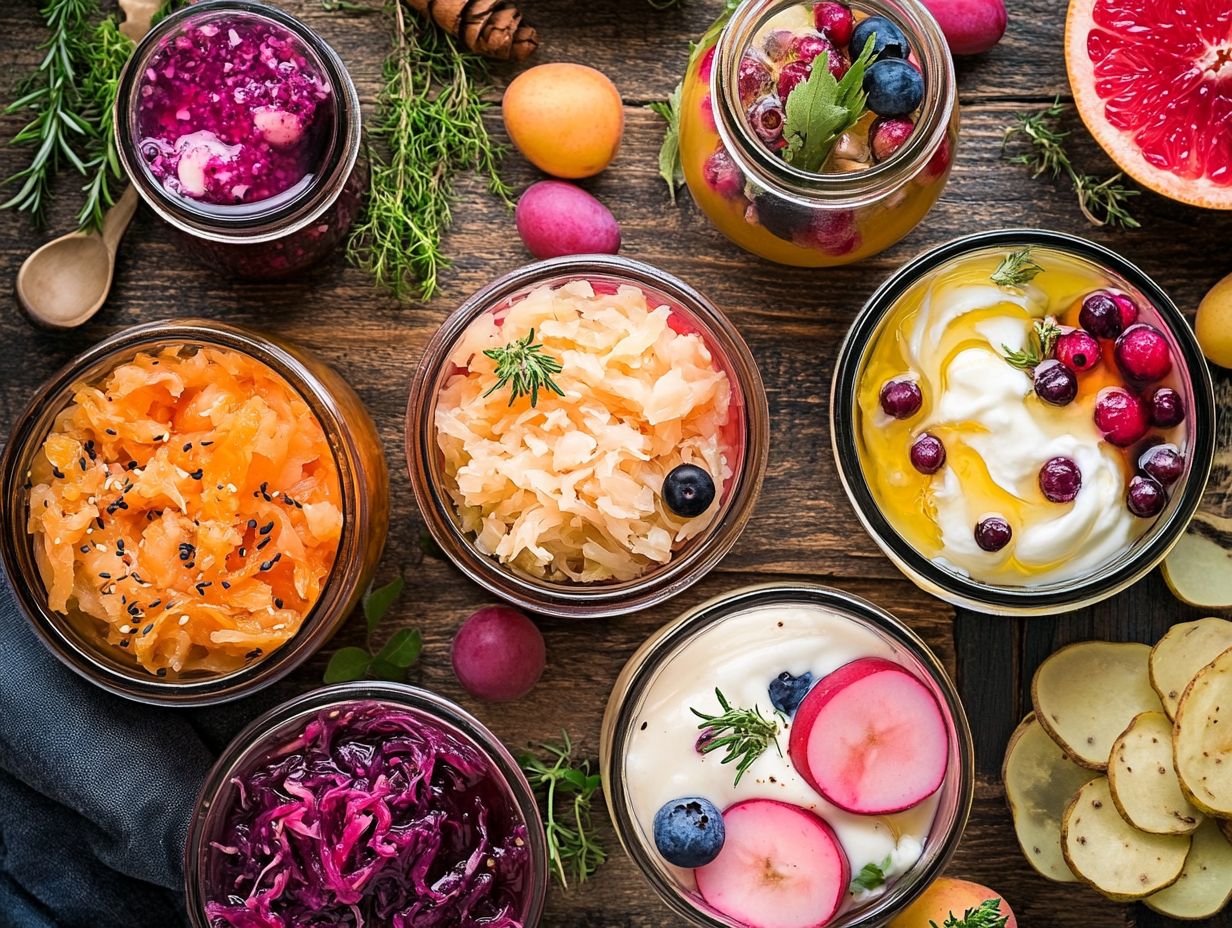
- Fermented foods improve digestion and promote gut health.
- They are rich in probiotics, boosting your immune system.
- Adding fermented foods to your meals is easy; consider sauerkraut on sandwiches or kefir as a drink.
1. Kombucha
Kombucha is a bubbly fermented tea that’s not just refreshing; it offers impressive health benefits.
This drink is packed with probiotics that support gut health and overall wellness. Research highlights its importance in a healthy diet.
Originating in Northeast China around 220 B.C., kombucha is made through a fermentation process involving sweetened tea and a culture of bacteria and yeast, known as SCOBY.
This magic introduces beneficial probiotics, known for enhancing digestive health.
With many flavors available, like fruity hibiscus and zesty ginger, you can enjoy its health benefits in countless ways.
Incorporating kombucha into your routine can lead to better health.
2. Sauerkraut
Sauerkraut is more than just a tangy topping; it s a fermented cabbage packed with health benefits.
This vibrant food enhances digestive health and is easy to make at home.
To make your own sauerkraut, finely shred cabbage, mix it with salt, and let it ferment in a cool, dark place for several weeks.
Sauerkraut can elevate many meals, whether as a sandwich topping or a side dish.
3. Kimchi
Kimchi, a traditional Korean dish made from fermented napa cabbage and radishes, adds flavor and health benefits to your meals.
Rich in probiotics, kimchi is a delicious way to embrace fermented foods. The fermentation process enriches its nutritional profile and extends shelf life.
Probiotics in kimchi nurture a balanced gut microbiome.
Adding kimchi is easy! Toss it in salads, layer on sandwiches, or mix into rice bowls for a flavor and nutrition boost.
4. Tempeh
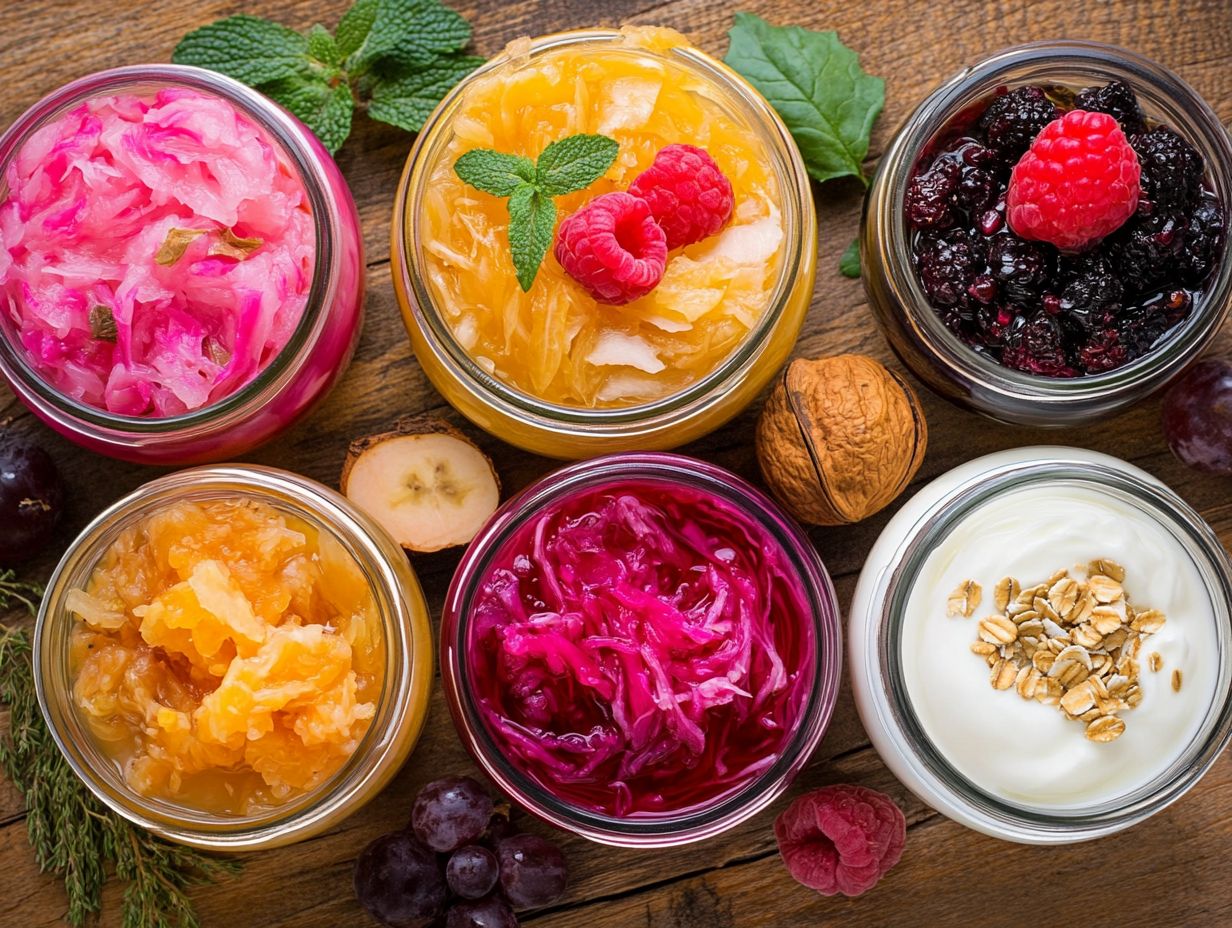
Tempeh is a fantastic fermented food made from soybeans. It s a great source of plant-based protein and is excellent for gut health due to its probiotics.
Originally from Indonesia, tempeh is becoming a key part of healthy diets worldwide. This ingredient is versatile and can be used in many dishes.
The fermentation process also helps your body absorb nutrients better. That makes tempeh more digestible than other soy products.
With its firm texture and nutty flavor, tempeh shines in various cooking methods. You can grill, saut , or crumble it into stews.
Many food lovers add tempeh to stir-fries, sandwiches, or salads. It s an exciting way to add more plant-based proteins to your meals.
Tempeh is loaded with vitamins, minerals, and healthy fats, making it a great choice for your diet.
5. Kefir
Kefir is a delicious fermented milk drink known for its tart and tangy flavor. It’s packed with probiotics and is famous for its health benefits, especially for gut health.
Imagine enjoying a kefir smoothie; it s a tasty way to boost your wellness while fitting into a healthy diet.
Originating from the Caucasus mountains, kefir has a long history. Its unique fermentation involves bacteria and yeast, enhancing flavor and boosting its nutritional value.
With its creamy texture and slight fizz, kefir works well in many recipes. You can blend it into smoothies or use it in salad dressings.
The probiotics in kefir support a balanced gut microbiome, improving digestion and boosting your immune system. This ancient drink is a modern health staple that deserves a spot in your daily routine.
What Are Fermented Foods and Why Are They Beneficial?
Fermented foods are both tasty and nutritious. They are made through fermentation, where bacteria and yeast convert sugars into acids or alcohol, creating unique flavors and health benefits, especially for your gut.
These foods are rich in probiotics, essential for a balanced diet. Options like kimchi and miso soup showcase their health advantages.
Fermentation improves both flavor and nutritional value, making these foods easier to digest. Probiotics help enhance digestive health and boost immunity.
Incorporating these probiotic-rich foods into your routine can reduce digestive issues and improve nutrient absorption.
Beyond kimchi and miso, consider other great examples like:
- Yogurt
- Sauerkraut
- Kefir
These foods demonstrate how fermentation can boost your well-being. They are valuable additions to any health-conscious diet.
How Do Fermented Foods Help with Digestion?
Fermented foods are essential allies in your quest for optimal digestive health. They are packed with probiotics, or healthy bacteria that support digestive health, which help maintain a balanced gut microbiome and enhance nutrient absorption.
By weaving these foods into your diet, you’ll likely notice improved gut health and a significant reduction in digestive issues. This makes them a vital part of a healthy lifestyle.
These probiotics, often dubbed good bacteria, work tirelessly in your gut to fight off bad bacteria, reduce inflammation, and promote a more efficient digestive process.
Consider incorporating these flavorful fermented foods into your meals:
- Yogurt
- Kefir
- Sauerkraut
- Kimchi
Each of these options is not only delicious but also versatile. Don t miss out! Add a delicious serving of yogurt to your breakfast today, enjoy kimchi as a side dish, or toss sauerkraut into your sandwiches and salads. Gradually introducing these foods allows your body to adjust while reaping substantial digestive benefits.
What Are the Other Health Benefits of Fermented Foods?
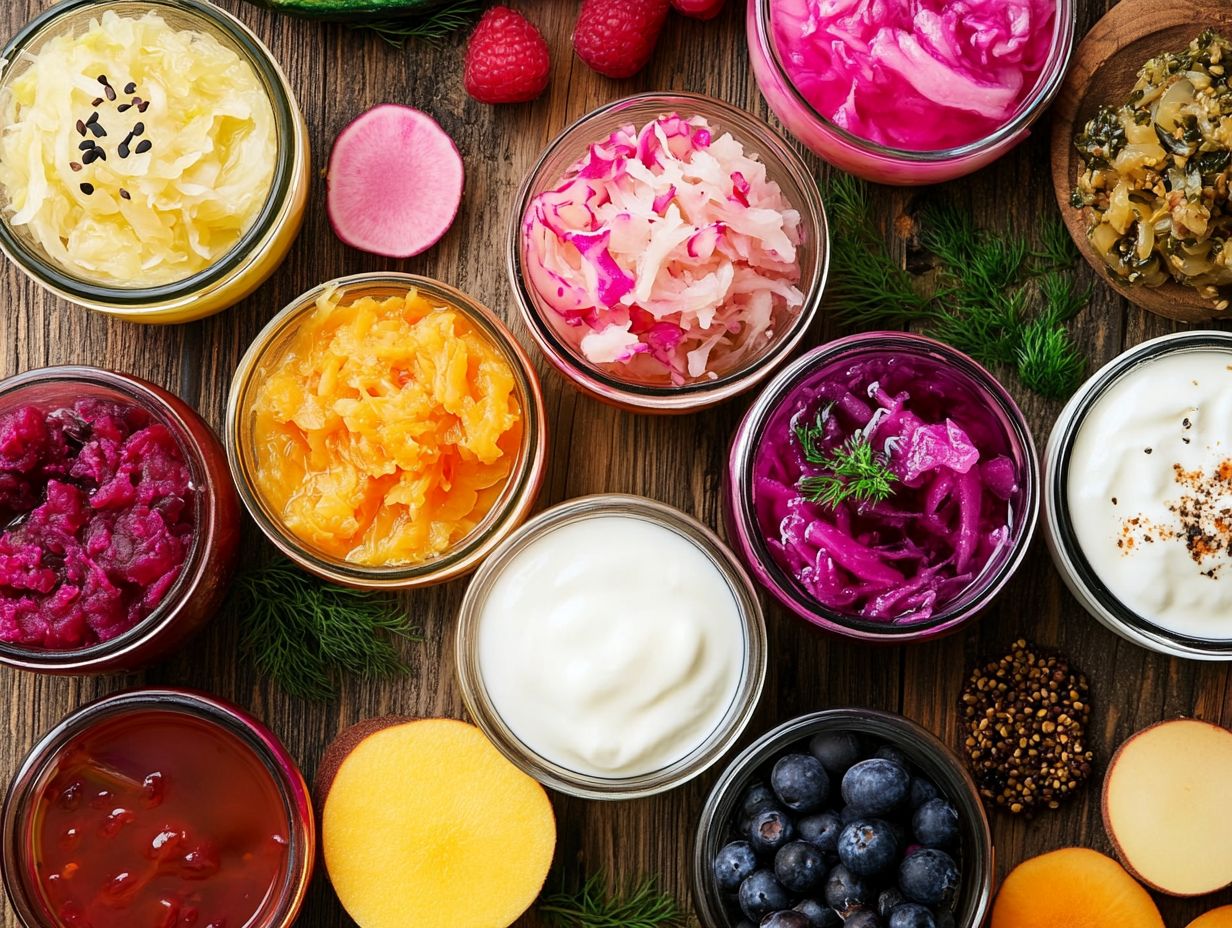
Beyond supporting digestion, fermented foods provide a wealth of health benefits. These include better weight management, boosted immune function, and a generous supply of vitamins and minerals that contribute to your overall health and wellness.
Their high fiber content seamlessly complements a healthy diet, making them an excellent addition for anyone looking to enhance their nutritional intake.
These nutrient-dense delights, like yogurt, kimchi, and sauerkraut, are not just tasty; they re also brimming with probiotics that help maintain a balance of gut bacteria. This balance is crucial for a strong immune system, as research indicates that a healthy gut can significantly improve your body s ability to ward off infections.
Incorporating fermented foods into your meals can aid in weight management by promoting feelings of fullness and curbing cravings, thanks to their fiber and protein content.
By making these foods a regular part of your diet, you set the stage for a healthier lifestyle, supporting metabolic processes and enhancing your overall well-being.
How Can One Incorporate Fermented Foods into Their Diet?
Incorporating fermented foods into your diet can be both effortless and delightful. There are countless ways to weave these nutritious options into your meals think of adding kimchi to your salads, savoring homemade sauerkraut as a side dish, or indulging in probiotic-rich yogurt smoothies.
Try experimenting with different types of fermented foods to discover your new favorites! Imagine mixing miso paste into your soups or salad dressings for a savory boost. You might consider adding kombucha as a refreshing base for vinaigrettes. For breakfast, why not pair some granola with kefir for a delightful twist?
Encouraging yourself to explore the versatility of fermented options opens up a world of flavor and wellness benefits. The richness of fermented foods has the potential to transform your everyday dishes into vibrant, healthful meals.
Are There Any Risks or Side Effects of Consuming Fermented Foods?
While fermented foods can be a treasure trove of health benefits, it s essential to remain mindful of potential risks or side effects, especially if you have specific digestive health issues or sensitivities to probiotics. Being aware of these risks gives you the power to make informed choices about adding fermented foods to your diet.
You might encounter allergic reactions that can range from mild to severe, manifesting as symptoms like hives or swelling. Digestive discomfort, such as bloating, gas, or an upset stomach, can also arise, particularly if you have pre-existing gastrointestinal conditions.
It s especially important for anyone with a history of food allergies or intolerances, as well as those with compromised immune systems, to proceed with caution when trying new fermented foods.
Consulting with a healthcare provider can offer you tailored guidance that aligns with your unique health status and dietary needs. This ensures that you can enjoy the benefits of fermented foods without compromising your well-being.
What Are Some Common Misconceptions About Fermented Foods?
Misconceptions about fermented foods can cause confusion. Many believe all fermented foods are healthy.
Understanding these foods can enhance your appreciation and guide better dietary choices.
Some think that eating fermented foods will fix all digestive issues. This isn t always true; your response can vary based on your gut health.
You might assume that every fermented product is rich in good bacteria. However, not all products have the same probiotic content.
Moderation is key. Overconsumption may lead to digestive discomfort.
Understanding your dietary needs helps you enjoy the benefits of fermented foods.
Frequently Asked Questions
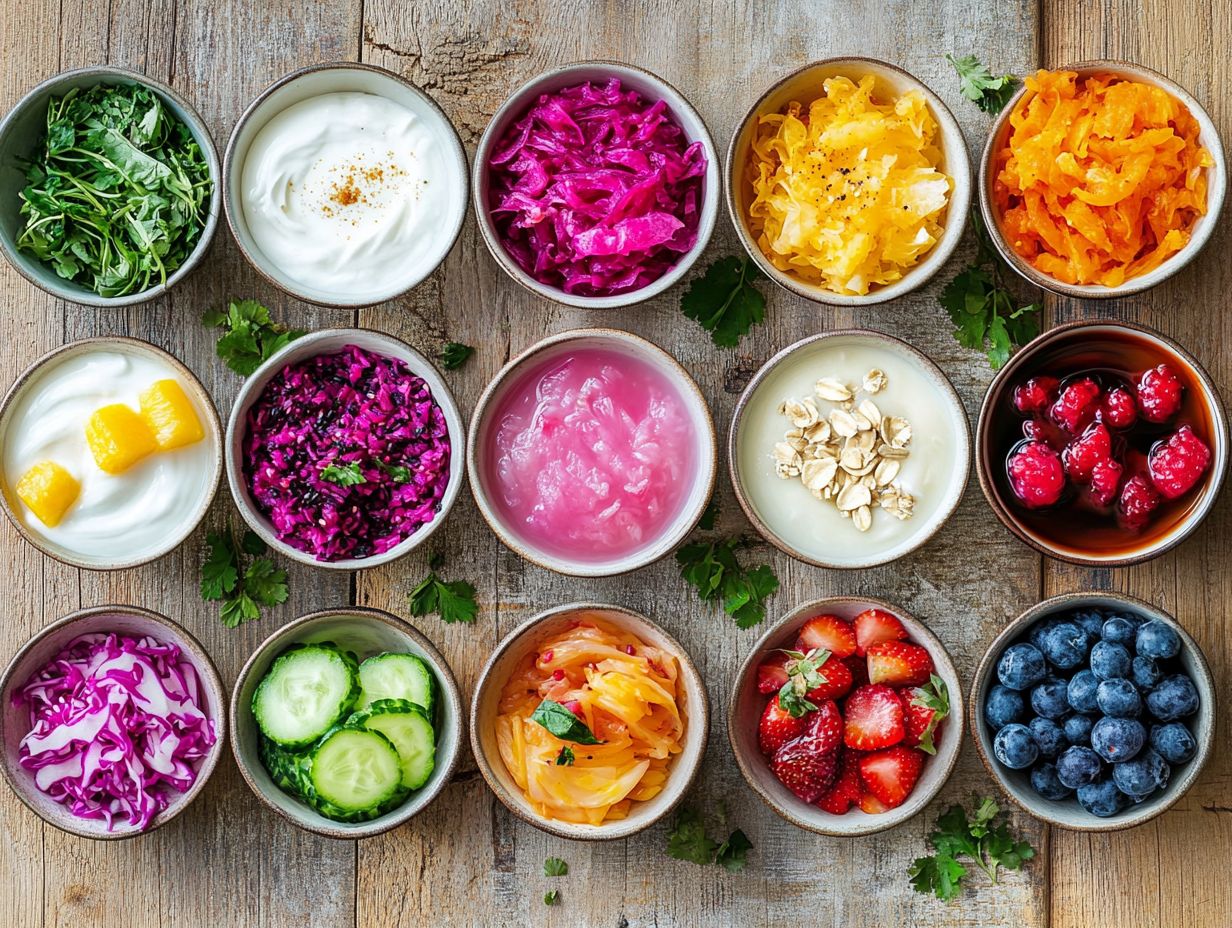
What are the health benefits of consuming fermented foods?
Fermented foods are rich in good bacteria that support digestion and boost your immune system. They also contain vitamins and antioxidants that can improve overall health.
What are the top 5 must-try fermented foods?
The top fermented foods to try are sauerkraut, kimchi, kombucha, kefir, and miso. Each offers delicious flavors along with impressive health benefits.
Are there any potential risks associated with consuming fermented foods?
While generally safe, fermented foods might not suit everyone. If you have a compromised immune system or specific medical conditions, consult a doctor before adding them to your diet.
Can fermented foods go bad?
Yes, fermented foods can spoil if not stored correctly. Always use airtight containers and keep them in the fridge to prevent spoilage.
What are some easy ways to incorporate fermented foods into my diet?
Add fermented foods to salads, sandwiches, or use them as sides. They also make tasty pizza toppings or can be blended into smoothies for an extra health kick.
Can I make my own fermented foods at home?
Absolutely! Many fermented foods are easy to make at home with simple ingredients. Just follow safe fermentation techniques to avoid contamination.


